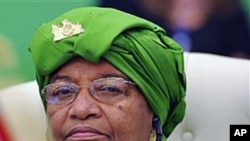Liberian President Ellen Johnson Sirleaf, who is seeking re-election this year, said U.S. aid to Liberia has helped the country rise from the ashes of war to become an emerging democratic nation.
President Sirleaf spoke at the U.S. Institute of Peace in Washington Friday on the progress her government has made and the challenges it faces.
She thanked the American people for their past support and appealed for a continuation of that support. But, Sirleaf said her government is looking for a partnership, not handouts.
“As I stated earlier, and emphatically, we came to Washington to make the case for sustained foreign assistance to Liberia. We are not seeking an open-ended commitment, but rather support in the next few years of this transition. If it happens, I’m confident, and I’ve made the commitment that Liberia will sustain its own development. We shall not ask for foreign assistance,” she says.
Sirleaf said her government has made progress in revitalizing the economy, rebuilding infrastructure and restoring services by introducing a Poverty Reduction Strategy.
“In 2008, when we wrote our Poverty Reduction Strategy, we re-grouped our tasks into four pillars: peace and security, economical revitalization, infrastructure and basic services, governance and the rule of law. It is through the hard work of the Liberian people that I can now stand before you today and say that our progress, and the lessons that we’ve learned along the way, have got us where we are today,” she says.
Critics of the government, including presidential candidate Dew Tuan Wleh Mason, who supported the president in 2005, say she should not be re-elected because she has failed to deliver on her promises.
“As my people asked me in Grand Gedeh (County), the question was asked as to why [I am] not supporting the president again? I said, ‘Well, we native people go around during Christmas time and dress the devil and we bring the devil to entertain us, and the drums begin to beat and the women begin to sing and we realize that the devil can’t dance. So, those of us who want to bring that devil to town, it becomes our responsibility to go and undress that devil and bring a new devil to town,’” Mason said.
Mason also said Sirleaf has failed to fight corruption, which he described as the albatross around Liberia’s neck.
“I think the first step is to show leadership by example; leadership in the fight against corruption must begin with the president. As you know, our people say the fish begins to rot from the head. We need to ensure that the president sets the example,” he says.
Some Liberians refer to the country’s judicial system as one that serves only the rich. As a result, they say they are frightened to seek redress in a court of law.
In her speech, Sirleaf admitted that the punishment aspect remains what she calls “the missing link” in the fight against corruption. But, she said her government will continue to tackle that problem.
“Battling corruption is at its core a battle of ideas, a battle of values, a battle of attitudes. We have been trying to take an approach that’s both systemic and preventive, and we have made progress,” she said.
Sirleaf said her government has strengthened the principles of fairness and professionalism by increasing compensation to reduce the incentive for corruption.
She said her government has also strengthened the principles of accountability by restructuring the country’s general auditing commission and establishing the Liberia Anti-Corruption Commission.
As a result, she said Liberia has moved up 41 places on the global index of Transparency International.
The Liberian leader said unemployment remains the biggest challenge and the priority of her government.
“We know that relying on our natural wealth and foreign investment along will not create jobs. We need to go one step beyond our own traditional experience and the experience of many of our African countries. We need more value added, more labor-intensive industries, more small business, more vocational training, and a sustained and renewed effort to raise the educational standards for all of our citizens,” she said.
Other critics say she has not done much to reconcile Liberians by what they say is her failure to implement the recommendations of the Truth and Reconciliation Commission (TRC).
The commission was set up 2003 to look into the root causes of the Liberian conflict from 1979 to 2003 and to make it possible for perpetrators to be held accountable for gross human rights violations.
The president said her government’s process of national healing and reconciliation is neither perfect nor complete. But, she said her government is convinced it has taken the necessary first step.




